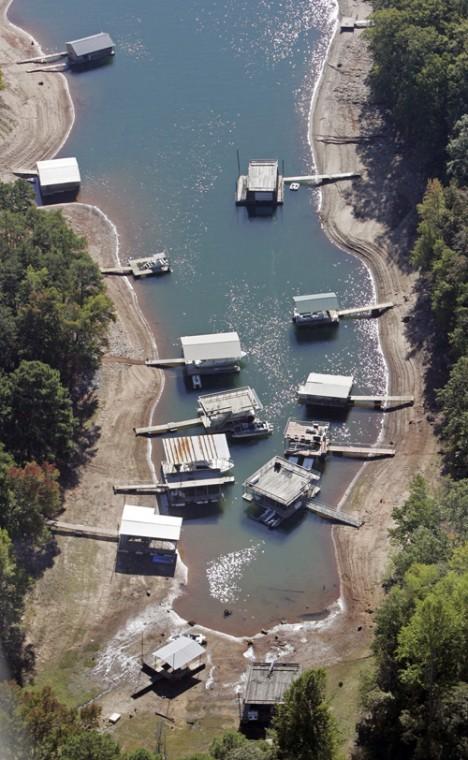Georgia declares state of emergency as drought depletes water resources
Exposed lake bed and beached boat docks are shown at Lake Lanier in Cumming, Ga., on Friday. Towns are threatening to ration the dwindling water supplies as lawmakers scramble to find solutions to the epic drought. Gov. Sonny Perdue declared a state of The Associated Press
Oct 22, 2007
Last updated on May 12, 2016 at 05:34 p.m.
CUMMING, Ga. – With water supplies rapidly disappearing during a drought of historic proportions, Gov. Sonny Perdue declared a state of emergency Saturday for the northern third of Georgia and asked President Bush to declare it a major disaster area.
Georgia officials warn that Lake Lanier, a 38,000-acre reservoir that supplies more than 3 million residents with water, is less than three months from depletion. Smaller reservoirs are dropping even lower.
Perdue asked the president to exempt Georgia from complying with federal regulations that dictate the amount of water released from Georgia’s reservoirs to protect federally protected mussel species downstream.
“We need to cut through the tangle of unnecessary bureaucracy to manage our resources prudently – so that in the long term, all species may have access to life-sustaining water,” he said.
Get The Daily Illini in your inbox!
On Friday, Perdue’s office asked a federal judge to force the Army Corps of Engineers to curb the amount of water it drains from Georgia reservoirs into streams in Alabama and Florida. Georgia’s environmental protection director is drafting proposals for more water restrictions.
More than a billion gallons of water is released from Lanier every day. The Corps of Engineers bases its water releases on two requirements: The minimum flow needed for a coal-fired power plant in Florida and mandates to protect two mussel species in a Florida river.
White House press secretary Dana Perino said Perdue’s request will be reviewed.
“In the meantime, we have already begun drafting interim rules to use procedures and flexibility to address the endangered species requirements and the Army Corps has started the process of revising the operations manual for the river basin,” Perino said.
Georgia lawmakers say neighboring states also are exploiting the law as a tool to draw more water from Georgia’s lakes.
“We’ve learned from this what a blunt weapon the Endangered Species Act has become,” said state Rep. John Linder. “We need to understand this lake was created not for mussels but for people.”
More than a quarter of the Southeast is covered by an “exceptional” drought – the National Weather Service’s worst drought category. The Atlanta area, with a population of 5 million, is smack in the middle of the affected region, which encompasses most of Tennessee, Alabama and the northern half of Georgia, as well as parts of North and South Carolina, Kentucky and Virginia.
Georgia was placed under statewide water restrictions in April that limited outdoor watering to three days a week. By May Atlanta allowed watering only on weekends, and in September environmental officials banned virtually all outdoor watering through the northern half of the state.
Restaurants have been asked to serve water only at a customer’s request and the governor called on residents to take shorter showers. More limits will probably be needed, said Carol Couch, director of Georgia’s Environmental Protection Division.
“This is not something we can conserve our way out of,” said Lt. Gov. Casey Cagle.
The state of emergency Perdue declared Saturday affects 85 Georgia counties, more than half of the state.






